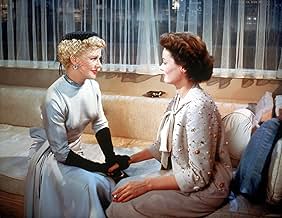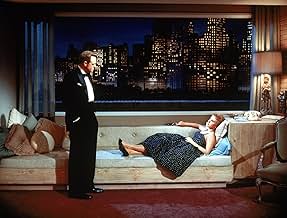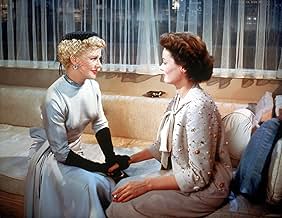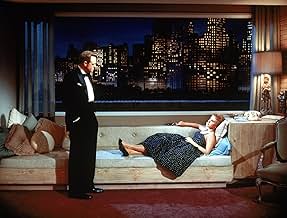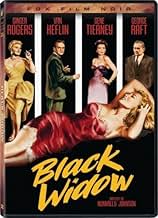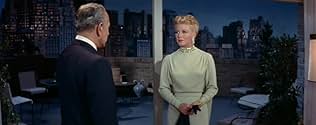IMDb RATING
6.7/10
3.5K
YOUR RATING
An aspiring young writer insinuates herself into the life of a Broadway producer only to meet an unexpected fate.An aspiring young writer insinuates herself into the life of a Broadway producer only to meet an unexpected fate.An aspiring young writer insinuates herself into the life of a Broadway producer only to meet an unexpected fate.
- Director
- Writers
- Stars
Mabel Albertson
- Sylvia
- (uncredited)
Edward Astran
- Party Guest
- (uncredited)
Bea Benaderet
- Mrs. Franklin Walsh
- (uncredited)
Mary Benoit
- Party Guest
- (uncredited)
Nesdon Booth
- Police A.P.B. Man
- (uncredited)
Paul Bradley
- Party Guest
- (uncredited)
Steve Carruthers
- Party Guest
- (uncredited)
- Director
- Writers
- All cast & crew
- Production, box office & more at IMDbPro
Featured reviews
Five years earlier, this drawingroom drama would have been filmed in small screen b&w. But the year is 1954 and film audiences are staying home with their new-fangled little black boxes. So a big budget studio like TCF takes what amounts to an "Ellery Queen in Manhattan" plot, gussies it up in lavish color, stretches the screen to Cinemascope length, loads up the marquee with big names, and sends the result out to compete with Lucille Ball and Milton Berle. I don't know how well the strategy succeeded commercially, but I enjoyed the movie then and still do.
As a whodunit, the mystery's only partially successful—not enough suspects and too convoluted to follow. At the same time, the pacing sometimes sags in ways that undercut the suspense. Still, the 95 minutes does add up to a gorgeous tapestry, thanks to expert art direction, set decoration, and a well-upholstered cast. And who could hold together a sometimes-confusing storyline better than the always-reliable Van Heflin. Also, I expect urbane writer-director Nunnally Johnson fit comfortably with the sophisticated Manhattan setting and show-biz personalities. So, it's not surprising that he gets off some insider innuendo. Catch the cocktail party shot at gossip columnist Hedda Hopper, known for her bizarre headgear; I expect Johnson was settling an old score there. Then too, having the ingénue (Garner) turn up mysteriously pregnant is rather daring for the straitjacketed Production Code period. Also, watch for the skinny young actor (Oliver) interviewed by Heflin near film's end. That's future TV mogul Aaron Spelling getting a proverbial foot in the door.
Anyway, the film provides an entertaining glimpse of drawingroom drama getting a face-lift during the early years of the television challenge.
As a whodunit, the mystery's only partially successful—not enough suspects and too convoluted to follow. At the same time, the pacing sometimes sags in ways that undercut the suspense. Still, the 95 minutes does add up to a gorgeous tapestry, thanks to expert art direction, set decoration, and a well-upholstered cast. And who could hold together a sometimes-confusing storyline better than the always-reliable Van Heflin. Also, I expect urbane writer-director Nunnally Johnson fit comfortably with the sophisticated Manhattan setting and show-biz personalities. So, it's not surprising that he gets off some insider innuendo. Catch the cocktail party shot at gossip columnist Hedda Hopper, known for her bizarre headgear; I expect Johnson was settling an old score there. Then too, having the ingénue (Garner) turn up mysteriously pregnant is rather daring for the straitjacketed Production Code period. Also, watch for the skinny young actor (Oliver) interviewed by Heflin near film's end. That's future TV mogul Aaron Spelling getting a proverbial foot in the door.
Anyway, the film provides an entertaining glimpse of drawingroom drama getting a face-lift during the early years of the television challenge.
Black Widow (1954)
An early full color Cinemascope drama, loaded with starts, and written by a high powered but somewhat forgotten stage and screen writer of the 40s and 50s, Nunnally Johnson. And this is one of a handful of films he directed, too. It's really quite a fully blossomed drama, and it grows with complexity as it goes. And it's packed with stars. The leading man has always impressed me even though he's not the handsome or powerful sort that usually commands the first credits, Van Heflin. he's really amazing, subtle and perfectly sophisticated and well meaning and (eventually) tortured.
His wife is played with usual cool cheerfulness by Gene Tierney, and their neighbor and friend is a haughty and ridiculous (perfectly so) Ginger Rogers. Rogers takes her role to the hilt, both in arrogance and frivolity and later in emotional breakdown.
What ensues is not just highbrow Broadway theater culture, but eventually a criminal (or psychologically suspenseful) tidal wave sweeps over the relatively lightweight beginnings, and the effect is kind of remarkable in its own way. I mean, it's so completely theatrical and melodramatic, and yet it really works as an interpersonal and heartfelt (and probing) drama, too. The writing is smart, nuanced, and it plays the line of being exactly what it is--meaning that it's about the very world that Johnson lives in.
The cop in this case is George Raft, always a little stiff and stiff again here, but he does his job. The seductress who is the center of all these talents is Peggy Ann Garner. Who is she? Well, after several years of being a successful child actress, and except for a small role in an obscure 1951 Fred Zinnemann film as an adult, Garner was a television actress (including some t.v. movies) bouncing from one series to another. Then, at the end of her career, she had small roles in three more features. And in many ways, she's the weak link here--she's supposed to be sleeping her way to success in the theater world, and yet there's something not quite right about her in this role. I suppose I underestimate middle aged rich men.
The plot this girl weaves for those around her is elaborate and devilish. And when it goes wrong for her, it really goes wrong for our main man Heflin. At the point the film is very much like Hitchcock film, with the apparently innocent man accused of a crime. Unlike Hitchcock, Johnson uses flashbacks at key points near the end., which do their job but also have a way of deflating the suspense.
See for yourself!
An early full color Cinemascope drama, loaded with starts, and written by a high powered but somewhat forgotten stage and screen writer of the 40s and 50s, Nunnally Johnson. And this is one of a handful of films he directed, too. It's really quite a fully blossomed drama, and it grows with complexity as it goes. And it's packed with stars. The leading man has always impressed me even though he's not the handsome or powerful sort that usually commands the first credits, Van Heflin. he's really amazing, subtle and perfectly sophisticated and well meaning and (eventually) tortured.
His wife is played with usual cool cheerfulness by Gene Tierney, and their neighbor and friend is a haughty and ridiculous (perfectly so) Ginger Rogers. Rogers takes her role to the hilt, both in arrogance and frivolity and later in emotional breakdown.
What ensues is not just highbrow Broadway theater culture, but eventually a criminal (or psychologically suspenseful) tidal wave sweeps over the relatively lightweight beginnings, and the effect is kind of remarkable in its own way. I mean, it's so completely theatrical and melodramatic, and yet it really works as an interpersonal and heartfelt (and probing) drama, too. The writing is smart, nuanced, and it plays the line of being exactly what it is--meaning that it's about the very world that Johnson lives in.
The cop in this case is George Raft, always a little stiff and stiff again here, but he does his job. The seductress who is the center of all these talents is Peggy Ann Garner. Who is she? Well, after several years of being a successful child actress, and except for a small role in an obscure 1951 Fred Zinnemann film as an adult, Garner was a television actress (including some t.v. movies) bouncing from one series to another. Then, at the end of her career, she had small roles in three more features. And in many ways, she's the weak link here--she's supposed to be sleeping her way to success in the theater world, and yet there's something not quite right about her in this role. I suppose I underestimate middle aged rich men.
The plot this girl weaves for those around her is elaborate and devilish. And when it goes wrong for her, it really goes wrong for our main man Heflin. At the point the film is very much like Hitchcock film, with the apparently innocent man accused of a crime. Unlike Hitchcock, Johnson uses flashbacks at key points near the end., which do their job but also have a way of deflating the suspense.
See for yourself!
Van Heflin is a theatrical producer who's suspected of murder in "Black Widow," a 1954 20th Century Fox Technicolor film directed by Nunnally Johnson. The film is set in New York among the sophisticated Broadway set, and the cast is full of familiar faces: Ginger Rogers, Gene Tierney, George Raft, Reginald Gardiner, Peggy Ann Garner, Virginia Leith, Otto Kruger, Mabel Albertson, and even Aaron Spelling.
Garner plays a young writer who, new to New York, keeps making increasingly important friends until she winds up an apparent suicide in the apartment of producer Peter Denver and his beautiful actress wife, Lottie. Soon, however, it's revealed that she was murdered, and Heflin is the prime suspect. During his own investigation as he tries to keep George Raft from putting him in prison, he learns that the sweet young thing may have been young, but she wasn't sweet.
Though a little slow at times, this is a highly entertaining film with its shots of New York and panoramic views from luxury apartments. The acting is wonderful. Ginger Rogers is great as the glamorous, acid-tongued Iris, a well-known actress with a ne'er do well husband, played effectively by Gardiner. Gene Tierney looks lovely but has a supporting role in this as Heflin's wife. The film sports two former child actors: Peggy Ann Garner as the murder victim and Skip Homeier as one of her love interests. Newcomer Virginia Leith is Homeier's sister and Garner's confidante. Garner looks appropriately innocent.
The looping in this film is very obvious for some reason - at least on television, some of the sound was fuzzy and then boom! the dubbing would come in. A very minor point. The mystery is intriguing, the glamor high, the dialogue sharp - an engrossing way to spend one's time.
Garner plays a young writer who, new to New York, keeps making increasingly important friends until she winds up an apparent suicide in the apartment of producer Peter Denver and his beautiful actress wife, Lottie. Soon, however, it's revealed that she was murdered, and Heflin is the prime suspect. During his own investigation as he tries to keep George Raft from putting him in prison, he learns that the sweet young thing may have been young, but she wasn't sweet.
Though a little slow at times, this is a highly entertaining film with its shots of New York and panoramic views from luxury apartments. The acting is wonderful. Ginger Rogers is great as the glamorous, acid-tongued Iris, a well-known actress with a ne'er do well husband, played effectively by Gardiner. Gene Tierney looks lovely but has a supporting role in this as Heflin's wife. The film sports two former child actors: Peggy Ann Garner as the murder victim and Skip Homeier as one of her love interests. Newcomer Virginia Leith is Homeier's sister and Garner's confidante. Garner looks appropriately innocent.
The looping in this film is very obvious for some reason - at least on television, some of the sound was fuzzy and then boom! the dubbing would come in. A very minor point. The mystery is intriguing, the glamor high, the dialogue sharp - an engrossing way to spend one's time.
I greatly enjoyed this Cinemascope, Stereo-Sound romp, but mainly as a Guilty Pleasure, as it's a film very much of it's time, with mismatched acting styles, lush, unbelievable sets, a central premise that doesn't make much sense (lending your expensive apartment to a just-met down-and-out writer while your wife's away),and an early attempt to make visual sense of the then-new wide-screen process.
Why do I like it? Ginger Rogers is way over the top, popping on and off screen with snappy diva one-liners, like Margo Channing on pep pills; Peggy Ann Garner plays a subversive Lolita, crazy-seductive and irresistible, and you can even spot Aaron Spelling towards the end in a bit part as a theatre employee.
The palette is loaded with pastel colors so popular in the 1950's, and the whole thing is sort of a mild domestic whodunit whipped up into an anemic Douglas Sirk confection. Great it ain't, but because of Rogers, Van Heflin, Gene Tierney (who has very little to do but does it beautifully) and Reginald Gardner, I found it greatly entertaining.
Why do I like it? Ginger Rogers is way over the top, popping on and off screen with snappy diva one-liners, like Margo Channing on pep pills; Peggy Ann Garner plays a subversive Lolita, crazy-seductive and irresistible, and you can even spot Aaron Spelling towards the end in a bit part as a theatre employee.
The palette is loaded with pastel colors so popular in the 1950's, and the whole thing is sort of a mild domestic whodunit whipped up into an anemic Douglas Sirk confection. Great it ain't, but because of Rogers, Van Heflin, Gene Tierney (who has very little to do but does it beautifully) and Reginald Gardner, I found it greatly entertaining.
This is a colourful mystery yarn, nothing to deep or steep, with a limited pallet of suspects. In the right hands this could of been a decent "Film Noir" but the colour all rather lush and plush on top of highly unsuitable widescreen which mostly ruins the framing of the actors while giving this studio shot film an artificial look that undermines the suspense. Nonetheless, this is enjoyable froth nicely dated and a good movie for a wet and lazy afternoon.
Did you know
- TriviaNunnally Johnson originally offered the role played by Ginger Rogers to Tallulah Bankhead, who called the writer-producer and, in a 25-minute phone conversation, gave him her reasons for rejecting the role. Rogers turned the part down as well, but had a change of heart after Johnson sent her a letter asking her to reconsider, on the proviso that she could take the relatively minor role and make it into a star-turn.
- GoofsWhen the suicide note is discovered by the Denvers, it is lying, uncreased, on the table. Later, during questioning, the detective produces it, folded up, from his pocket. A cop would never mishandle and mutilate evidence that way.
- Quotes
[opening narration]
Peter Denver: The Black Widow, deadliest of all spiders, earned its dark title through its deplorable practice of devouring its mate.
- Crazy creditsOpening credits are shown over the background of a spider web made by a black widow.
- ConnectionsFeatured in Ginger Rogers at Twentieth Century Fox (2007)
- SoundtracksTheme from 'Dance of the Seven Veils'
from "Salome"
by Richard Strauss
[Played occasionally throughout the picture]
- How long is Black Widow?Powered by Alexa
Details
- Release date
- Country of origin
- Language
- Also known as
- La viuda negra
- Filming locations
- 1515 Broadway, Manhattan, New York City, New York, USA(Hotel Astor exterior near Times Square)
- Production company
- See more company credits at IMDbPro
Box office
- Budget
- $1,095,000 (estimated)
- Runtime
- 1h 35m(95 min)
- Color
- Aspect ratio
- 2.55 : 1
Contribute to this page
Suggest an edit or add missing content


